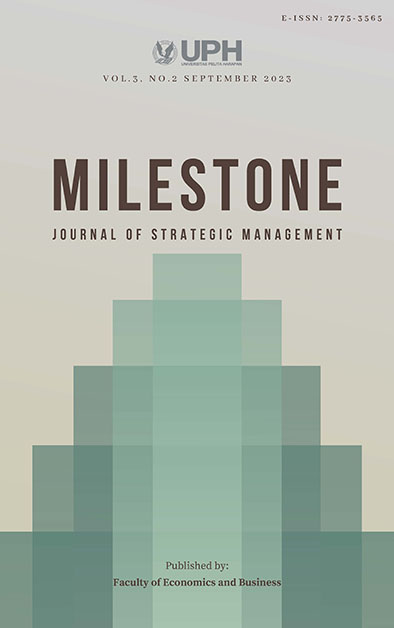MEDIA COMPANY'S STRATEGIC ANALYSIS USING BALANCE SCORECARD
DOI:
https://doi.org/10.19166/ms.v3i2.7439Keywords:
Media, internet, competitive advantage, balanced scorecardAbstract
The three steps of Media Innovation are focusing on optimizing TikTok, implementing a fair usage policy (FUP), and working strategically with Starlink. Optimization of TikTok aims to optimize digital marketing campaigns; the application of FUP includes regulations governing the fair use of internet bandwidth. And use Starlink satellite technology to expand the market. External adjustments in communication, branding, and interaction with customers and stakeholders. All activities and initiatives can be monitored by applying the balanced scorecard to measure media performance by considering four perspectives. Qualitative research methods through document studies to discuss the use of the balanced scorecard in dealing with external influences, analyze the industrial environment, discover internal strengths and weaknesses, and develop creative strategies and appropriate action plans, as well as change management to become the basis for implementing the desired changes for overall company performance measurement.
References
Amelia, L. (2023, April 27). Manfaat layanan cloud untuk mengoptimalkan bisnis. Linknet Enterprise. https://www.linknet.id/article/manfaat-layanan-cloud-untuk-mengoptimalkan-bisnis
Balanced Scorecard Institute (n.d.). Balanced Scorecard Basics. https://balancedscorecard.org/bsc-basics-overview/
First Media (2023, January 25). Hadir dengan kecepatan internet hingga 5x lebih kencang. https://www.firstmedia.com/article/hadir-dengan-kecepatan-internet-hingga-5x-lebih-kencang
Ittner, C. D., & Larcker, D. F. (1998). Innovations in performance measurement: Trends and research implications. Journal of Management Accounting Research, 10, 205-238. https://papers.ssrn.com/sol3/papers.cfm?abstract_id=137278
Kaplan, R. S., & Norton, D. P. (2004). Strategy maps: Converting intangible assets into tangible outcomes. Harvard Business School Press.
Linknet (n.d.). 2021 Annual Report. https://ir.linknet.co.id/financials/annual-reports/
Miller, K. (2020). 5 critical steps in the change management process. HBS Online. https://online.hbs.edu/blog/post/change-management-process
Morrison, Z. J., Gregory, D., & Thibodeau, S. (2012). “Thanks for Using Me”: An exploration of exit strategy in qualitative research. International Journal of Qualitative Methods, 11(4), 416-427. https://doi.org/10.1177/160940691201100408
Olve, N. G., Roy, J., & Wetter, M. (1999). Performance drivers: A practical guide to using the balanced scorecard. John Wiley & Sons.
Schneiderman, A. M. (2009). Creating the balanced scorecard as a strategic management system. Journal of Corporate Accounting & Finance, 20(6), 63-71.
Downloads
Published
Issue
Section
License
Authors who publish with this journal agree to the following terms:
1) Authors retain copyright and grant the journal right of first publication with the work simultaneously licensed under a Creative Commons Attribution License (CC-BY-SA 4.0) that allows others to share the work with an acknowledgement of the work's authorship and initial publication in this journal.
2) Authors are able to enter into separate, additional contractual arrangements for the non-exclusive distribution of the journal's published version of the work (e.g., post it to an institutional repository or publish it in a book), with an acknowledgement of its initial publication in this journal.
3) Authors are permitted and encouraged to post their work online (e.g., in institutional repositories or on their website). The final published PDF should be used and bibliographic details that credit the publication in this journal should be included.





